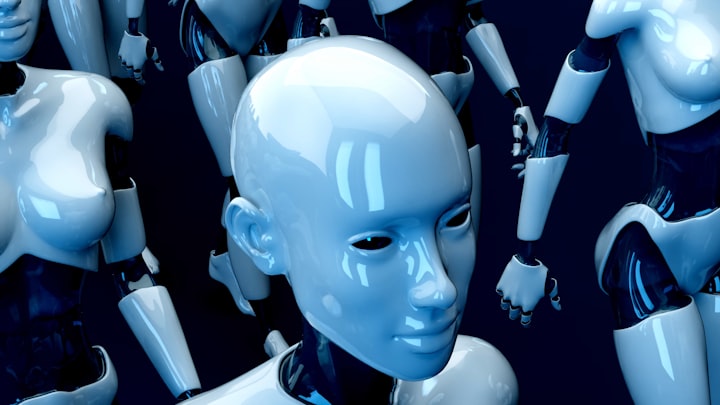AI's Impact on Healthcare: Advancements and Challenges
Examining the Influence of AI in Revolutionizing Health Services, Unravelling Potential Obstacles

Introduction: The interface of artificial intelligence (AI) and healthcare marks a revolutionary change in the medical landscape. As AI’s potential is progressively harnessed, it has shown profound capacity to streamline patient care, improve diagnosis and treatment, and optimize health outcomes. However, amidst these advancements, specific challenges need careful navigation. This article explores the transformative impact of AI on healthcare, addressing breakthroughs, and contemplating potential roadblocks.
AI Advancements Revolutionizing Healthcare:
Disease Diagnosis and Prediction: AI's predictive analytics and pattern recognition capabilities have made a significant difference in disease diagnosis and prognosis. Machine learning models, trained on vast amounts of data, can detect anomalies and predict disease trends, often quicker and more accurately than traditional methods. They have shown marked prowess in diagnosing conditions ranging from cancer to cardiovascular diseases, enabling early intervention and improved patient outcomes.
Drug Discovery: AI-driven platforms have catapulted advancements in pharmaceutical research, particularly in drug discovery. AI algorithms can rapidly analyze enormous databases of existing drugs and potential compounds, predicting their effectiveness against specific diseases. This can substantially speed up the laborious and expensive process of drug development and approval.
Personalized Medicine: AI is fuelling progress in personalized medicine, incorporating individual variation in genes, environment, and lifestyle. AI algorithms can predict how patients will respond to treatments, enabling healthcare professionals to tailor therapies to individual needs, increasing efficacy and minimizing side effects.
Telemedicine and Virtual Assistance: In times of need, AI has backed the expansion of telemedicine with virtual health assistants, online consultations, and remote patient monitoring. It aids in reaching rural or remote areas, providing reliable healthcare access and reducing the burden on overstretched healthcare facilities.
Healthcare Administrative Tasks: AI applications like speech recognition and machine learning aim to automate administrative tasks, including scheduling appointments, maintaining patient records, and billing processes, enhancing efficiency and accuracy.
Challenges Facing AI Implementation in Healthcare:
Data Privacy and Security: Patient data forms the crux of AI algorithms. While it vastly improves diagnostic and predictive capabilities, it also raises serious concerns about privacy, data protection, and potential misuse.
Algorithmic Bias: Bias lurking in the data used to train AI could lead to inaccuracies and unfair outcomes. Ensuring the equity of AI systems and their compliance with ethical standards is crucial to avoid potential harm to patients.
Adoption and Trust: Despite AI’s potential, trust and reluctance to stray from traditional practices may hamper AI adoption in healthcare. Cultivating a deeper understanding of AI and its benefits can help in fostering acceptance among healthcare professionals and patients alike.
Regulatory Oversight: As AI usage grows, so does the need for robust regulatory oversight to ensure system validity, reliability, and transparency. Implementing clear governance and oversight mechanisms can help secure patient safety and trust in AI.
Conclusion: The tides of AI have reached the vast realm of healthcare, revealing an ocean of opportunities while challenging us with tricky currents. The promise it holds to reshape healthcare services is undeniable, yet critical questions of privacy, bias, acceptance, and regulation loom alongside. As we continue to explore and harness the potential of AI in healthcare, it's crucial to address these challenges to create an environment that safeguards patient interests while reaping AI's benefits.
Remember, the above piece is synthesized by an AI and should be used for formative understanding rather than as professional advice.
Unraveling Further AI's Impact on Healthcare
Digital Health Records: As healthcare systems produce massive amounts of information, AI aids in managing data and fortifies Electronic Health Records (EHR). It streamlines the documentation process, minimizes human error, and enhances the accuracy of clinical records. Through natural language processing, AI can organize, parse, and extract relevant data from complex medical reports, accelerating data retrieval and facilitating efficient patient management.
Proactive Health Management: More than just reactive, AI nurtures a proactive approach in healthcare. By leveraging wearable technology and personalized health monitoring, AI can help predict potential health issues and recommend healthy lifestyle practices. It transforms healthcare from a repair-centric model to a preventative, personalized approach, empowering individuals to take charge of their wellness.
Precision Surgery: Robotic-assisted procedures illustrate AI's instrumental role in surgery. With superior precision, AI-led robotic systems can perform intricate surgeries minimizing human limitations and risks. Furthermore, AR and VR technologies fuse with AI to create immersive simulations for more precise surgical planning and training.
Mental Health Care: AI’s influence extends to mental health care, principally through chatbots that can perform cognitive behavioral therapy, enabling more accessible mental health assistance. Amid rising concerns over mental health, AI provides a supplementary support system to conventional therapies.
AI's Edge in Pandemics: The global health crisis reaffirms the pivotal role AI plays during pandemics. AI has helped anticipate the spread of the virus, developed tools for early detection, and intensified the search for treatments and vaccines. It enabled health systems to respond swiftly and adaptively to the unexpected surge in demand.
Addressing Emerging Challenges:
Health Inequalities: As AI pervades healthcare, it's crucial to address concerns of health inequalities. Resource-poor settings might face the risk of being left behind in this revolution, exacerbating disparities. Ensuring the equitable distribution of AI benefits could help democratize access to quality health care.
Interdisciplinary Collaboration: AI's influence on healthcare necessitates interdisciplinary collaboration among tech experts, healthcare professionals, ethicists, policymakers, and patients. Their joint efforts can ensure better-informed, ethically sound, patient-centric AI applications in healthcare.
Transparency and Explainability: AI's decision-making process, often called the "black box," lacks transparency. For healthcare professionals and patients to trust AI in sensitive matters of health, they need to understand its workings and reasoning. Efforts towards explainable AI can bolster the trust of stakeholders in the healthcare sector.
Education and Training: Finally, there’s an exigency for education and training for clinicians in AI. As machine learning and AI become increasingly involved in clinical decision-making, healthcare professionals must be adequately trained to utilize these tools safely and effectively.






Comments
There are no comments for this story
Be the first to respond and start the conversation.